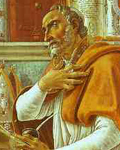* * *
REPLACEMENT THEOLOGY
by Alan Torres | Then I saw thrones, and they sat on them, and judgment was given to them. And I saw the souls of those who had been beheaded because of their testimony of Jesus and because of the word of God, and those who had not worshiped the beast or his image, and had not received the mark on their forehead and on their hand; and they came to life and reigned with Christ for a thousand years. - Revelation 20:4 |
Recently I watched a television show where I heard the speaker teach the following about the relationship between the believing Church and Israel: "The Church becomes Jewish by circumcision, just as Abraham did, they become adopted Jews. The Church like Israel occupies the land of Israel in the Kingdom to come, the Church inherits this earth. This is the story for the true Church, like Abraham, for all who have faith in Jesus Christ -- its all the same faith of Abraham." This comment didn't surprise me, since the nature of the Church, in its relationship to Israel, has always been one of the great theological controversies in Christianity. There are really only two views, either the Church is a continuation of Israel, or the Church is totally different and distinct from Israel.
The Church is a Continuation of Israel
The dominant view in Christianity has been that the Church is the New Israel, a continuation of the concept of Israel from the Old Testament.
This view teaches that the Church is the replacement for Israel and that the many promises made to Israel in the Bible are fulfilled in the Christian Church, not in biblical, literal, Israel. So, the prophecies in Scripture concerning the blessing and restoration of Israel to the Land of Promise are "spiritualized" into promises of God's blessing for the Church.
The prophecies of condemnation and judgment, however, still remain for national Israel and the Jewish people. This view has been called Replacement Theology because the Church replaces Israel in the program of God. Major problems exist with this view, such as the continuing existence of the Jewish people throughout the centuries and especially with the revival of the modern state of Israel. If Israel has been condemned by God, there being no future for the Jewish nation, how do we account for the supernatural survival of the Jewish people, Israel's rebirth among the gentile nations, victories in major wars with the Arabs and a flourishing modern democratic Jewish state?
The Church Is Totally Different and Distinct from Israel
Although being suppressed throughout the history of the Church, the view that Israel and the Church are different is clearly taught in the New Testament. In this view, the Church is completely different and distinct from Israel and the two are never to be confused or used interchangeably.
We are taught from Scripture that the Church is an entirely new creation, that came into being on the Day of Pentecost and will continue until it is translated to Heaven at the Rapture (Eph. 1:9-11). The Church has no relationship to the curses and blessings for Israel, the covenants, promises and warnings are valid only for Israel. Israel has been set aside in God's program during these past 2,000 years of dispersion. The Lord has preserved the Jewish people through great persecutions, though they are largely in unbelief.
After the Rapture (1 Thess. 4:16-18) God will restore Israel. The first event at this time is the "Time of Jacob's Trouble," also known as the Great Tribulation. This is a horrible period of seven years, which begins moderately during the first half then intensifies in full during the latter half. The world will be judged for rejecting Christ, while Israel is prepared through the trials of the Great Tribulation for the Second Coming of the Messiah. Now, when Christ does return to the earth, at the end of the Tribulation, Israel will be ready to receive Him. The remnant of Israel which survives the Tribulation will be saved and the Lord will establish His kingdom on this earth with the capital as Jerusalem. With Christ reigning as King, Israel will be the leading nation and representatives from all nations will come to Jerusalem to honor and worship the King. The Church will return with Christ and will reign with Him for a literal thousand years (Rev. 20:1-5).
The History of the Change
How did the thinking in the Church change toward Israel? Slowly, the Gentile majority in the Church began to view Israel as a relic of the past.
With spiritual competition between the two groups, we can see why the Church adopted the view that it was the new Israel. The view of the Church was that the destruction of Jerusalem and the Temple in 70 AD was brought about divinely, that God had ordained the end of Jewish unbelieving Israel.
Since Jerusalem was in ruins and the Jewish people were scattered throughout the world, it seemed evident that God was finished with national Israel. Theologians now proposed that Israel in the Scriptures did not really mean literal Israel, instead, it meant the Church. The Church now became the new Israel and through this spiritualization, wherever blessings are spoken of to Israel in the Old Testament, it was interpreted to mean the Church. In essence they simply replaced Israel with the Church.
Replacement Theology become the position of the Church during the time of Augustine (A.D. 354-430), who popularized it in his book The City of God. Initially Augustine claimed that he was a Chiliast, the belief in the literal thousand year reign of Christ on the earth, the basic view of Premillennialism today. Having come to the conclusion that this view was "inferior" and "carnal," he adopted the position that the reign of Christ should be much more "spiritual" and it would occur during this present Church Age. His spiritualizing method, of course, eliminated true Israel and the losing of all the promises God made to the Jewish nation, which he viewed as now being fulfilled within the Church.
What Did The Apostolic Church Believe?
Almost all students of the early church agree that Premillennialism, or Chiliasm, was the most widely held view of the apostolic church. Philip Schaff, the noted authority on church history writes, | "The most striking point in the eschatology of the ante-Nicene Age [A.D. 100-325] is the prominent chiliasm, or millenarianism, . . . a widely current opinion of distinguished teachers, such as Barnabas, Papia, Justin Martyr, Irenaeus, Tertullian, Methodius, and Lactantius" (Philip Schaff. History of the Christian Church. New York: Scribner, 1884, Vol. 2, p. 614). |
Premillennialism began to die out in the established Catholic Church during the time of Augustine, though it has always survived as a Church doctrine.
Even when it has not been widely known it survived through "underground" and "fringe" groups of Believers. The last 200 years have seen the greatest development and spread of Premillennialism, which, like the early church, recognizes a future glorious hope for literal Israel. Beginning in Britain and spreading to America, consistent Premillennialism, known as Dispensational Premillennialism, has come forth as a major theological view in the Church.
The Biblical Basis for Premillennialism
Both the Old Testament and the New Testament support a Premillennial understanding of God's plan for humanity. Even so, the strongest support for Premillennialism is found in the clear teaching of Revelation 20:1-7, where it says, six times, that Christ's kingdom will last 1,000 years.
After the Tribulation the Lord will return and establish His kingdom with the nation of Israel, Christ will reign over the whole earth with Jerusalem as His capital and Israel will be the leader of the nations. The Church will reign with Him for a literal thousand years. *
Alan Torres is a staff member and writer for the Biblicist, at
http://www.biblicist.org/bible/main.shtml. This article is reprinted by permission,
and may be viewed in its original form at http://www.biblicist.org/bible/replace.shtml.
Many other fine articles and other materials may be found at the Biblicist. Thank you, Alan. * * * Return to Home Page
;
 |



